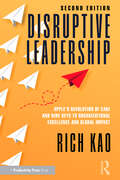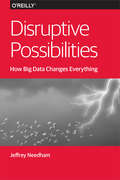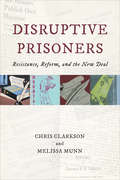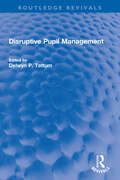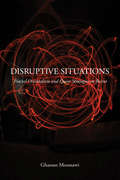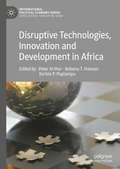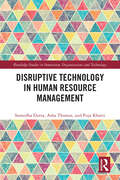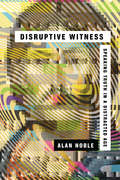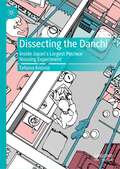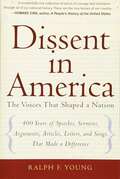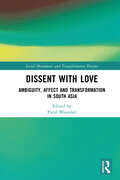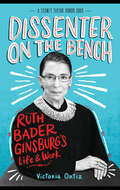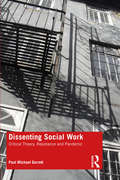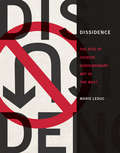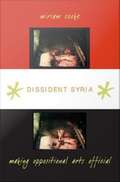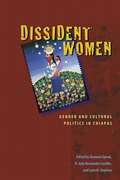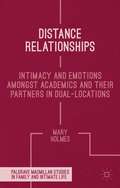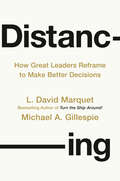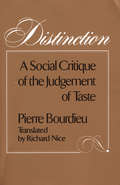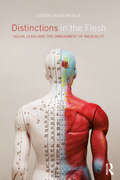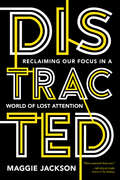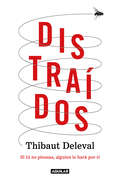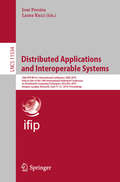- Table View
- List View
Disruptive Leadership: Apple's Revolution of Care and Nine Keys to Organizational Excellence and Global Impact
by Rich KaoCompanies worldwide are striving to transform their industries through innovative products and services. Becoming a disruptive organization, however, is easier said than done. Even more difficult is being a company that continually disrupts. Is it possible to discern a code for how companies can achieve this? In this highly readable and engaging book, a disruptive leadership framework is proposed in which caring deeply is placed at the center of the model. Apple is used as the leading example. By turning care into a focal point, a triphasic model is proposed that moves from the personal sphere (individual), to the corporate arena (organizational), and then to the global stage (impact). Nine key factors are identified along this path for how companies can achieve organizational excellence.This second edition updates all the facts, data, and history around Apple since the first edition and calls out how its revolution of care continues to not only validate its success but astound with its seemingly unfettered upside. Its ability to disrupt seems to have no limits, thus challenging business leaders, present and future, to incorporate the DNA of care as they build and scale businesses. In addition to the previously profiled companies such as Nike, IKEA, 3M, and Starbucks, new case studies including Uniqlo, Alibaba, On Running, 7-Eleven, and Costco are presented to supplement Apple’s story.Features: A new organizational model is given for interpreting Apple's success. Nine principles of organizational excellence are discerned from this new model. Promotes caring deeply as a focal point for approaching disruptive leadership. New corporate profiles include Uniqlo, Alibaba, On Running, 7-Eleven, and Costco. Application questions and assignments are included for each chapter, making it an ideal training tool for leadership development and personal application.
Disruptive Possibilities: How Big Data Changes Everything
by Jeffrey NeedhamBig data has more disruptive potential than any information technology developed in the past 40 years. As author Jeffrey Needham points out in this revealing book, big data can provide unprecedented visibility into the operational efficiency of enterprises and agencies.Disruptive Possibilities provides an historically-informed overview through a wide range of topics, from the evolution of commodity supercomputing and the simplicity of big data technology, to the ways conventional clouds differ from Hadoop analytics clouds. This relentlessly innovative form of computing will soon become standard practice for organizations of any size attempting to derive insight from the tsunami of data engulfing them.Replacing legacy silos—whether they’re infrastructure, organizational, or vendor silos—with a platform-centric perspective is just one of the big stories of big data. To reap maximum value from the myriad forms of data, organizations and vendors will have to adopt highly collaborative habits and methodologies.
Disruptive Prisoners: Resistance, Reform, and the New Deal
by Chris Clarkson Melissa MunnDisruptive Prisoners reconstitutes the history of Canada’s federal prison system in the mid-twentieth century through a process of collective biography – one involving prisoners, administrators, prison reformers, and politicians. This social history relies on extensive archival research and access to government documents, but more importantly, uses the penal press materials created by prisoners themselves and an interview with one of the founding penal press editors to provide a unique and unprecedented analysis. Disruptive Prisoners is grounded in the lived experiences of men who were incarcerated in federal penitentiaries in Canada and argues that they were not merely passive recipients of intervention. Evidence indicates that prisoners were active agents of change who advocated for and resisted the initiatives that were part of Canada’s "New Deal in Corrections." While prisoners are silent in other criminological and historical texts, here they are central figures: the juxtaposition of their voices with the official administrative, parliamentary, and government records challenges the dominant tropes of progress and provides a more nuanced and complicated reframing of the post-Archambault Commission era. The use of an alternative evidential base, the commitment of the authors to integrating subaltern perspectives, and the first-hand accounts by prisoners of their experiences of incarceration makes this book a highly readable and engaging glimpse behind the bars of Canada’s federal prisons.
Disruptive Pupil Management (Routledge Revivals)
by Delwyn P. TattumFirst published in 1986, Disruptive Pupil Management presents a comprehensive overview of the disruptive behaviour in schools in the light of the Elton Report. The emphasis of this book is that a preventative approach to the problem is a more valid response than this crisis management approach which results in pupils being sent to special units. The book therefore stresses the importance of schools managing their own techniques and interpersonal skills, rather than schools importing solutions. This book is a must read for all educationists, teachers, and researchers of primary and secondary education.
Disruptive Situations: Fractal Orientalism and Queer Strategies in Beirut
by Ghassan MoussawiDisruptive Situations challenges representations of contemporary Beirut as an exceptional space for LGBTQ people by highlighting everyday life in a city where violence is the norm. Ghassan Moussawi, a Beirut native, seeks to uncover the underlying processes of what he calls “fractal orientalism,” a relational understanding of modernity and cosmopolitanism that illustrates how transnational discourses of national and sexual exceptionalism operate on multiple scales in the Arab world. Moussawi’s intrepid ethnography features the voices of women, gay men and genderqueers in Beirut to examine how queer individuals negotiate life in this uncertain region. He examines “al-wad’,” or “the situation,” to understand the practices that form these strategies and to raise questions about queer-friendly spaces in and beyond Beirut. Disruptive Situations alsoshows how LGBTQ Beirutis resist reconciliation narratives and position their identities and visibility at different times as ways of simultaneously managing their multiple positionalities and al-wad’. Moussawi argues that the daily survival strategies in Beirut are queer—and not only enacted by LGBTQ people—since Beirutis are living amidst an already queer situation of ongoing precarity.
Disruptive Technologies, Innovation and Development in Africa (International Political Economy Series)
by Kobena T. Hanson Korbla P. Puplampu Peter ArthurThis book examines how disruptive technologies and innovation underpin the attainment of a broader development agenda in Africa. Contributors show how distinctive forms of technological innovation can impact critical development processes. For example, disruptive technologies can deepen the ongoing democratic and governance waves in Africa, specifically in the area of contested elections. Similarly, innovations in agriculture, the environment and energy promote changes in value chain agriculture, and the use of sensors to manage e-waste and sustainable energy conservation are also transforming established practices. Furthermore, the role of disruptive technologies and innovation in education, health, financial services and the nature of paid work cannot be ignored. Individually and collectively, the authors discuss and highlight the mechanisms and initiatives that can contribute to the realization of the development goals of African countries, especially in a period where disruptive technologies are rapidly changing how things are done. As a result, this book, which represents one of the most recent systematic efforts to bring together dialogue on disruptive technologies in Africa, will be of particular use and benefit to a wide and an eclectic audience.
Disruptive Technology in Human Resource Management (Routledge Studies in Innovation, Organizations and Technology)
by Sumedha Dutta Asha Thomas Puja KhatriTechnological breakthroughs obliterate established methods and change entire industries. Disruptive technologies are seen as drivers of various business processes, and one area that these technologies have had a profound impact on is human resource management (HRM). The applications of disruptive technology in the field of HRM represent an ever-intriguing domain for researchers and professionals. These technologies have altered the processes of acquitting, hiring, training, and managing employees. The book Disruptive Technology in Human Resource Management is an attempt to lucidly explain the significant makeover introduced by a few significant disruptive HRM technologies - artificial intelligence, blockchain, big data/data analytics, robotics, cloud computing, digital transformation, and social media. It examines how disruptive technologies have impacted the evolution of numerous HR practices, including but not limited to recruitment, selection, orientation, training, employee welfare, performance evaluation, pay structure, and job design.Corporate examples help highlight the manner in which the amalgamation of disruptive technology with HRM has increased the strategic relevance of HRM. The book provides tools, tactics, and perspective to innovate, push oneself, excite others, and establish a world-changing disruptive business model. This real-world book provides concise insights into how disruptive technology open doors to in-cash multifold HRM opportunities.Combining theory with practice, this volume will be of value to scholars and upper-level students across HRM, and technology and innovation management.
Disruptive Witness: Speaking Truth in a Distracted Age
by Alan NobleWhat should Christian witness look like in our contemporary society? In this timely book, Alan Noble looks at our cultural moment, characterized by technological distraction and the growth of secularism, laying out individual, ecclesial, and cultural practices that disrupt our society's deep-rooted assumptions and point beyond them to the transcendent grace and beauty of Jesus.
Dissecting the Danchi: Inside Japan’s Largest Postwar Housing Experiment
by Tatiana KnorozThe book is the first to explore the history and political significance of the Japanese public housing program. In the 1960s, as Japan's postwar economy boomed, architects and urban planners inspired equally by Western modernism and Soviet ideas of housing as a basic right created new cityscapes to house populations turned into refugees by the war. Over time, as Japan's society aged and the economy began to stagnate, these structures have become a burden on society. In this closely researched monograph on the conditions of Japanese housing, Tatiana Knoroz sheds unexpected light on the rise and fall of the idea of social democracy in Japan which will be of interest to historians, architects, and scholars of Asian economic modernization.
Dissent In America: Voices That Shaped A Nation
by Ralph F. YoungThis collection of primary sources presents the story of US History as told by dissenters who, throughout the course of American history, have fought to gain rights they believed were denied to them or others, or who disagree with the government or majority opinion. Each document is introduced by placing it in its historical context, and thought-provoking questions are provided to focus the student when s/he reads the text. Instructors are at liberty to choose the documents that best highlight a theme they wish to emphasize.
Dissent in Dangerous Times
by Austin SaratWhile dissent has played a central role in our national history and in the American cultural imagination, it is usually dangerous to those who practice it, and always unpalatable to its targets. War does not encourage the tolerance of opposition at home any more than it does on the front: if the War on Terror is to be a permanent war, then the consequences for American political freedoms cannot be overestimated.
Dissent with Love: Ambiguity, Affect and Transformation in South Asia (Social Movements and Transformative Dissent)
by Parul BhandariThis book presents a unique rendering of love in South Asia by reading love through the specific lens of dissent. It presents multiple articulations of dissenting love in contemporary South Asia including negotiations with parents to assert choice of partner, migration, elopement, live-in relationships, singlehood, ‘new’ ideas of masculinities, and embracing diverse sexual identities. It studies these forms of dissent in the context of changing legal discourses, impact of media in everyday life, and transforming social attitudes. As such, this book is the first of its kind to analyse the myriad ways in which love and dissent constitute each other shaping the social, political, and cultural mores and movements of South Asia. The contributions are based on ethnographic research cutting across diverse religious, ethnic, and gender and sexual identities of South Asia.Part of the Social Movements and Transformative Dissent series, this book will be of interest to students and researchers of sociology, anthropology, history, geography, political science, gender studies, and media studies. It will also appeal to academics who study South Asia with a special focus on love, intimacy, sexuality, marriage, migration, history, politics and media.
Dissenter on the Bench: Ruth Bader Ginsburg's Life & Work (The Sidney Taylor Honor Books)
by Victoria OrtizA 2020 Sydney Taylor Honor Book The life and career of the fiercely principled Supreme Court Justice, now a popular icon, with dramatic accounts of her landmark cases that moved the needle on legal protection of human rights, illustrated with b/w archival photographs. Dramatically narrated case histories from Justice Ginsburg's stellar career are interwoven with an account of RBG&’s life—childhood, family, beliefs, education, marriage, legal and judicial career, children, and achievements—and her many-faceted personality is captured. The cases described, many involving young people, demonstrate her passionate concern for gender equality, fairness, and our constitutional rights. Notes, bibliography, index.
Dissenting Social Work: Critical Theory, Resistance and Pandemic
by Paul Michael GarrettThis book, from one of international social work’s leading radical educators, provides a richly compelling argument for the profession to become more critical and dissenting. Addressing the troubled times in which we find ourselves, Garrett’s book examines a broad range of theoretical frameworks and draws on diverse writers, such as Marx, Foucault, Brown, Zuboff, Rancière, Wacquant, Arendt, Levinas, Fanon and Gramsci. The author’s panoramic vision encompasses Ireland, the United Kingdom, the United States, Algeria, Israel/Palestine and China. Timely, lively and accessible, this book speaks directly to some of the main preoccupations of our era. Readers will be encouraged to relate developments in social work to key themes circulating around migration, the threat of neo-fascism, surveillance culture, colonialism, the Black Lives Matter movement and the COVID-19 pandemic. Imbued with a sense of hope for a brighter future, this book encourages a new generation of social work students to recognise and examine the importance of critical theory for understanding the structural forces shaping their lives and the lives of those with whom they work and provide services. This book is vital, indispensable and essential reading for social work students and other readers, throughout the world, seeking to make the connection between social work, social theory and sociology.
Dissidence: The Rise of Chinese Contemporary Art in the West
by Marie LeducHow the valorization of artistic and political dissidence has contributed to the rise of Chinese contemporary art in the West. Interest in Chinese contemporary art increased dramatically in the West shortly after the 1989 Tiananmen Square protests. Sparked by political sympathy and the mediatized response to the event, Western curators, critics, and art historians were quick to view the new art as an expression of dissident resistance to the Chinese regime. In this book, Marie Leduc proposes that this attribution of political dissidence is not only the result of latent Cold War perceptions about China, but also indicative of the art world's demand for artistically and politically provocative work—a demand that mirrors the valorization of free expression in liberal democracies. Focusing on nine Chinese artists—Wang Du, Wang Keping, Huang Yong Ping, Yang Jiechang, Chen Zhen, Yan Pei-Ming, Shen Yuan, Ru Xiaofan, and Du Zhenjun—who migrated to Paris in and around 1989, Leduc explores how their work was recognized before and after the Tiananmen Square incident. Drawing on personal interviews with the artists and curators, and through an analysis of important exhibitions, events, reviews, and curatorial texts, she demonstrates how these and other Chinese artists have been celebrated both for their artistic dissidence—their formal innovations and introduction of new media and concepts—and for their political dissidence—how their work challenges political values in both China and the West. As Leduc concludes, the rise of Chinese contemporary art in the West highlights the significance of artistic and political dissidence in the production of contemporary art, and the often-unrecognized relationship between contemporary art and liberal democracy.
Dissident Syria: Making Oppositional Arts Official
by Miriam CookeFrom 1970 until his death in 2000, Hafiz Asad ruled Syria with an iron fist. His regime controlled every aspect of daily life. Seeking to preempt popular unrest, Asad sometimes facilitated the expression of anti-government sentiment by appropriating the work of artists and writers, turning works of protest into official agitprop. Syrian dissidents were forced to negotiate between the desire to genuinely criticize the authoritarian regime, the risk to their own safety and security that such criticism would invite, and the fear that their work would be co-opted as government propaganda, as what miriam cooke calls "commissioned criticism. " In this intimate account of dissidence in Asad's Syria, cooke describes how intellectuals attempted to navigate between charges of complicity with the state and treason against it. A renowned scholar of Arab cultures, cooke spent six months in Syria during the mid-1990s familiarizing herself with the country's literary scene, particularly its women writers. While she was in Damascus, dissidents told her that to really understand life under Hafiz Asad, she had to speak with playwrights, filmmakers, and, above all, the authors of "prison literature. " She shares what she learned in Dissident Syria. She describes touring a sculptor's studio, looking at the artist's subversive work as well as at pieces commissioned by the government. She relates a playwright's view that theater is unique in its ability to stage protest through innuendo and gesture. Turning to film, she shares filmmakers' experiences of making movies that are praised abroad but rarely if ever screened at home. Filled with the voices of writers and artists, Dissident Syria reveals a community of conscience within Syria to those beyond its borders.
Dissident Women: Gender and Cultural Politics in Chiapas
by Shannon SpeedDrawing from studies on topics ranging from the daily life of Zapatista women to the effect of transnational indigenous women in tipping geopolitical scales, the contributors explore both the personal and global implications of indigenous women's activism. The Zapatista movement and the Women's Revolutionary Law, a charter that came to have tremendous symbolic importance for thousands of indigenous women, created the potential for renegotiating gender roles in Zapatista communities. Drawing on the original research of scholars with long-term field experience in a range of Mayan communities in Chiapas and featuring several key documents written by indigenous women articulating their vision, Dissident Women brings fresh insight to the revolutionary crossroads at which Chiapas stands—and to the worldwide implications of this economic and political microcosm.
Distance Relationships
by Mary HolmesDrawing on interviews with UK couples in distance relationships, this book seeks to explain, evaluate and advance sociological debates about intimate life. It provides a rich and human perspective on how bodies, emotions and connections to others are key in maintaining intimate relationships.
Distancing: How Great Leaders Reframe to Make Better Decisions
by L. David Marquet Michael A. GillespieDistance gives you perspective. Bestselling author of Turn the Ship Around! former US Navy Captain David Marquet and professor of psychology Michael Gillespie show you how to make better decisions by becoming your own coach.Be yourself. Be fully present. Be in the moment. This is a message we hear constantly. While this may be beneficial some of the time, the biggest obstacle to making wiser decisions that actually drive lasting success is ourselves. Being fully immersed in our own limited point of view biases our decisions toward defending our previous actions and maintaining our self-image. We need to exit our me-here-and-now self and get an outside perspective that sees us and the situation we are in objectively. We need a coach.This book shows us how to become our own coach by using a mental technique called psychological distancing. We do this in three ways: self-distancing, spatial distancing, and temporal distancing. First, we can be someone else, inhabiting another&’s perspective. This activates the neutral observer&’s outside point of view. Second, we can be somewhere else. We zoom out and see ourselves from afar, as just another person who is part of a larger context. Third, we can be sometime else, imagining that we are our future selves who are thinking back to what we wish we had done today. In each case, we can coach ourselves from this distanced perspective. The result is a powerful and immediate reframe of how we see ourselves, our situation, and what we should do.Featuring compelling scientific research, business cases, and exercises, Distancing equips us with effective practical tools to reduce anxiety, see more clearly, and make better decisions for ourselves and for our organizations.
Distinction: A Social Critique of the Judgement of Taste (Routledge Classics Ser.)
by Pierre BourdieuNo judgment of taste is innocent. In a word, we are all snobs. Pierre Bourdieu brilliantly illuminates this situation of the middle class in the modern world. France’s leading sociologist focuses here on the French bourgeoisie, its tastes and preferences. Distinction is at once a vast ethnography of contemporary France and a dissection of the bourgeois mind. In the course of everyday life people constantly choose between what they find aesthetically pleasing and what they consider tacky, merely trendy, or ugly. Bourdieu bases his study on surveys that took into account the multitude of social factors that play a part in a French person’s choice of clothing, furniture, leisure activities, dinner menus for guests, and many other matters of taste. What emerges from his analysis is that social snobbery is everywhere in the bourgeois world. The different aesthetic choices people make are all distinctions—that is, choices made in opposition to those made by other classes. Taste is not pure. Bourdieu finds a world of social meaning in the decision to order bouillabaisse, in our contemporary cult of thinness, in the “California sports” such as jogging and cross-country skiing. The social world, he argues, functions simultaneously as a system of power relations and as a symbolic system in which minute distinctions of taste become the basis for social judgment. The topic of Bourdieu’s book is a fascinating one: the strategies of social pretension are always curiously engaging. But the book is more than fascinating. It is a major contribution to current debates on the theory of culture and a challenge to the major theoretical schools in contemporary sociology.
Distinctions in the Flesh: Social Class and the Embodiment of Inequality (CRESC)
by Dieter VandebroeckThe past decades have witnessed a surge of sociological interest in the body. From the focal point of aesthetic investment, political regulation and moral anxiety, to a means of redefining traditional conceptions of agency and identity, the body has been cast in a wide variety of sociological roles. However, there is one topic that proves conspicuously absent from this burgeoning literature on the body, namely its role in the everyday (re)production of class-boundaries. Distinctions in the Flesh aims to fill that void by showing that the way individuals perceive, use and manage their bodies is fundamentally intertwined with their social position and trajectory. Drawing on a wide array of survey-data – from food-preferences to sporting-practices and from weight-concern to tastes in clothing – this book shows how bodies not only function as key markers of class-differences, but also help to naturalize and legitimize such differences. Along the way, it scrutinizes popular notions like the ‘obesity epidemic’, questions the role of ‘the media’ in shaping the way people judge their bodies and sheds doubt on sociological narratives that cast the body as a malleable object that is increasingly open to individual control and reflexive management. This book will be of interest to scholars of class, lifestyle and identity, but also to social epidemiologists, health professionals and anyone interested in the way that social inequalities become, quite literally, inscribed in the body.
Distinctions in the Flesh: Social Class and the Embodiment of Inequality (CRESC)
by Dieter VandebroeckThe past decades have witnessed a surge of sociological interest in the body. From the focal point of aesthetic investment, political regulation and moral anxiety, to a means of redefining traditional conceptions of agency and identity, the body has been cast in a wide variety of sociological roles. However, there is one topic that proves conspicuously absent from this burgeoning literature on the body, namely its role in the everyday (re)production of class-boundaries.Distinctions in the Flesh aims to fill that void by showing that the way individuals perceive, use and manage their bodies is fundamentally intertwined with their social position and trajectory. Drawing on a wide array of survey-data – from food-preferences to sporting-practices and from weight-concern to tastes in clothing – this book shows how bodies not only function as key markers of class-differences, but also help to naturalize and legitimize such differences. Along the way, it scrutinizes popular notions like the ‘obesity epidemic’, questions the role of ‘the media’ in shaping the way people judge their bodies and sheds doubt on sociological narratives that cast the body as a malleable object that is increasingly open to individual control and reflexive management.This book will be of interest to scholars of class, lifestyle and identity, but also to social epidemiologists, health professionals and anyone interested in the way that social inequalities become, quite literally, inscribed in the body.
Distracted: Reclaiming Our Focus in a World of Lost Attention
by Maggie JacksonThis visionary book details the steep costs of our deepening crisis of distraction and reveals remarkable scientific discoveries that can help us rekindle our powers of focus and sustained attention.In the first edition of this groundbreaking book, Maggie Jackson sounded a prescient warning of a looming crisis: the fragmentation of attention that is eroding our abilities to problem-solve, innovate, and care for one another. Now in this updated edition with an incisive new preface, she offers both a renewed wake-up call and a path forward as we reckon with one of the most pressing problems of our time. How can we harness the technological marvels of our age more wisely and turn data into knowledge and distraction into skillful attention? How can we reset human bonds in a time of deep disconnection? We must, she argues, curb technological excess by cultivating the full gamut of our attentional capabilities. We must look first to the human behind the device. Jackson is our expert guide in exploring the historic roots of distraction, the perils we face in melding human and machine, and the cutting-edge science that reveals the attentional skills most needed in an age of overload. Timely and unforgettable, Distracted offers a harrowing yet hopeful account of the fate of our highest human capacity.
Distraídos: Si tú no piensas, alguien lo hará por ti
by Thibaut DelevalEste libro se lee fácilmente pero no es simple; es provocador, pero no sensacionalista; es interesante, pero no pedante y nos descubre cosas verdaderamente impactantes acerca de cómo vivimos y pensamos en un mundo hiperconectado y volátil. ¿Por qué pensamos tan poco y tan mal? Nunca en la historia hemos tenido tanta información a nuestro alcance como hoy. Sin embargo, parece que cada vez contamos con menos capacidad crítica y acudimos con frecuencia al razonamiento rápido, automático y sesgado que propician la demagogia, la publicidad y los entornos digitales. Distraídosnos apela a todos. Thibaut Deleval establece un diálogo muy directo con los lectores, explica con claridad lo que impide reflexionar con rigor y libertad y nos lanza un reto: reaprender a pensar con criterio para que nadie lo haga por nosotros. ¿Te atreves? «La duda es la antesala de la activación de la inteligencia. Si no somos capaces de dudar,no vamos a poder ponernos a pensar. ¿De qué dudar? Primero deberíamos aprender a dudar de esas corazonadas y ocurrencias que surgen más de nuestras emociones que de nuestra reflexión. También deberíamos dudar de lo que escuchamos. No todo lo que se dice en la televisión es verdad ni tampoco todo lo que se publica online o en papel. (...)El problema es que dudar supone un esfuerzo y muchas veces una incomodidad, porque dudar significa contemplar la posibilidad de que podríamos, de manera eventual, estar... ¡equivocados!».
Distributed Applications and Interoperable Systems: 19th IFIP WG 6.1 International Conference, DAIS 2019, Held as Part of the 14th International Federated Conference on Distributed Computing Techniques, DisCoTec 2019, Kongens Lyngby, Denmark, June 17–21, 2019, Proceedings (Lecture Notes in Computer Science #11534)
by Laura Ricci José PereiraThis book constitutes the proceedings of the 19th IFIP International Conference on Distributed Applications and Interoperable Systems, DAIS 2019, held in Kongens Lyngby, Denmark, in June 2019, as part of the 14th International Federated Conference on Distributed Computing Techniques, DisCoTec 2019. The 9 full papers presented together with 2 short papers were carefully reviewed and selected from 28 submissions. The papers addressed challenges in multiple application areas, such as the Internet-of-Things, cloud and edge computing, and mobile systems. Some papers focused on middleware for managing concurrency and consistency in distributed systems, including data replication and transactions.
